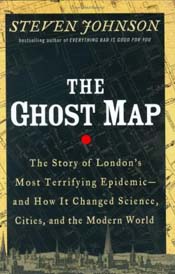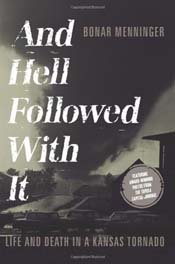Title: The Ghost Map: The Story of London’s Most Terrifying Epidemic — and How It Changed Science, Cities, and the Modern World
Author: Steven Johnson
Narrator: Alan Sklar
Genre: Narrative Nonfiction
Year: 2006
Acquired: Library
Rating: 




Book Review: Just about every book that talks abut Victorian London inevitably spends time talking about how unclean the city became before the birth of modern sanitation. And one event that makes it into just about every book as the perfect example of the impact of sanitation is the cholera epidemic of 1854, when residents of a single neighborhood were decimated in a 10-day period by one of the worst disease outbreaks in the city’s history.
Despite reading about the Broad Street outbreak in at least three or four different books, I didn’t really know much about it until I read The Ghost Map by Steven Johnson, which is a day-by-day account of the outbreak, following the two men responsible for figuring out the cause: Reverend Henry Whitehead, a local clergyman with intimate knowledge of the community, and Dr. John Snow, one of the first people to help prove cholera was spread through water and not through the air.
What I loved most about this book was that, despite its focus on a 10-day terror, Johnson manages to explore epidemiology, cartography, sociology, biology, history, public health, and more. And despite being so expansive, the book manages to say focused on the event and the aftermath and two truly admirable Victorian gentlemen. I enjoyed just about every minute of this book.
Audio Review: Alan Sklar, the narrator for this book, was excellent. I didn’t have any complaints about his performance at all. One challenge of listening to the book on audio was the back and forth in time, from the current 1854 epidemic to previous cholera outbreaks. If I wasn’t focusing, it was possible to get lost in what was going on. Johnson does go back to Whitehead and Snow enough to get back on track.
Other Reviews: A Book a Week | Maggie Reads | One-Minute Book Reviews |
If you have reviewed this book, please leave a link to the review in the comments and I will add your review to the main post. All I ask is for you to do the same to mine — thanks!


 Monday Tally is a weekly link round-up of some of my favorite posts discovered over the week. If you have suggestions for Monday Tally, please e-mail sophisticated [dot] dorkiness [at] gmail [dot] com. Enjoy!
Monday Tally is a weekly link round-up of some of my favorite posts discovered over the week. If you have suggestions for Monday Tally, please e-mail sophisticated [dot] dorkiness [at] gmail [dot] com. Enjoy!


